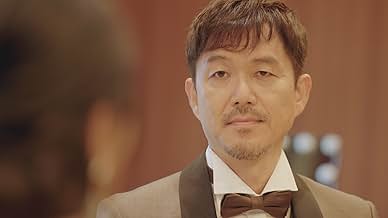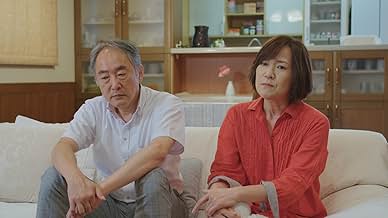IMDb-BEWERTUNG
7,0/10
1104
IHRE BEWERTUNG
Heiratswillige Singles in Japan lernen sich in dieser Reality-Datingserie kennen, kommen zusammen und verloben sich, bevor sie sich überhaupt zu Gesicht bekommen haben.Heiratswillige Singles in Japan lernen sich in dieser Reality-Datingserie kennen, kommen zusammen und verloben sich, bevor sie sich überhaupt zu Gesicht bekommen haben.Heiratswillige Singles in Japan lernen sich in dieser Reality-Datingserie kennen, kommen zusammen und verloben sich, bevor sie sich überhaupt zu Gesicht bekommen haben.
Folgen durchsuchen
Empfohlene Bewertungen
I really enjoyed this series. As an American that has never been to Japan, I found it even more interesting to learn about the culture and how the contestants went about dating. The contestants led with their brain instead of their heart which is typically seen in American dating shows. I also enjoyed seeing the places that they visited for the getaway and the apartments that they lived in leading up to the wedding. Plus their budget is huge as shown by the design for the pods, living quarters, the flower filled bridge for where the couple meets if they get engaged and the hotel for the getaway!
The contestants took the experience seriously especially when compared to those on the American version. Although some of the contestants fell for the same person, there wasn't any animosity or drama over it. There were no cat fights and both the male and female groups provided a sense of support for one another. This show was filled with love and you can't but hope that everyone finds someone.
I liked that the couples who did get "married" or just walked down the aisle showed that it is possible to fall in love without seeing the other first. I enjoyed hearing about their reservations before the wedding and how they worked on them as a couple. All of the couples took the dating process more seriously and that is shown in the types of conversations that they had on the dates.
The contestants took the experience seriously especially when compared to those on the American version. Although some of the contestants fell for the same person, there wasn't any animosity or drama over it. There were no cat fights and both the male and female groups provided a sense of support for one another. This show was filled with love and you can't but hope that everyone finds someone.
I liked that the couples who did get "married" or just walked down the aisle showed that it is possible to fall in love without seeing the other first. I enjoyed hearing about their reservations before the wedding and how they worked on them as a couple. All of the couples took the dating process more seriously and that is shown in the types of conversations that they had on the dates.
Everyone come from all walks of life. There is no perfect Prince Charming or princess. Everyone has their flaws and definitely their own charms. It is a really interesting and diversified show.
Not only did the people act in a much classier way (such as not swearing, not talking about their sex lives, wearing more modest clothes) but they acted nicer to each other and it showed in the friendships formed in the female/male groups. I felt I learned a lot about Japanese culture and how it has changed over the last decades. For example I was surprised that these couples easily wanted to live together immediately as I thought that was still kind of taboo in Japan. I really felt the emotions were very real in this show, especially when the men would cry / be upset. It made me sad when one of them was crying, man or woman and I felt sorry for the couples who broke up early on, but was glad it wasn't up at the alter like the American version. That made it also seem more realistic. And the couples that made it through were so adorable. I really hope there will be a season 2 of this version. My favorite part in each show is the wedding gown try ons and the wedding scenes, the women look so beautiful.
I like the premise of the first season of the American version, even though some of the contestants were disappointing in their behavior towards their partners. I had an inkling that the Japanese version of the show would be better than that first American version.
What really surprised me was the very healthy mix of contestants by the producers. Most of the contestants truly seemed more interested in being potential marital partners over promoting their own businesses or boosting their social media profiles.
In any matchmaking process, there are always going to be matches that don't work out along the way. An encouraging point is that these participants seem to have learned valuable lessons along the way, even if it didn't translate to forever love in front of the camera.
What really surprised me was the very healthy mix of contestants by the producers. Most of the contestants truly seemed more interested in being potential marital partners over promoting their own businesses or boosting their social media profiles.
In any matchmaking process, there are always going to be matches that don't work out along the way. An encouraging point is that these participants seem to have learned valuable lessons along the way, even if it didn't translate to forever love in front of the camera.
Love is Blind Japan presents a captivating departure from the familiar dramatic flair of its American and Swedish counterparts. Unlike the exaggerated narratives that often overshadow sincerity in those versions, the Japanese adaptation offers a refreshing authenticity. Contestants in the Japanese version exhibit a keen awareness of their conversations, emphasizing meaningful dialogue over scripted drama.
One notable aspect is how conflicts are approached with artful skill and respect, showcasing a cultural nuance that adds depth to the show. The contestants, in their pursuit of love, demonstrate an admirable commitment to genuine connections. In a television landscape saturated with manufactured drama, Love is Blind Japan stands out as a more serious and realistic social experiment.
The subdued and muted demeanor of the participants contributes to a less theatrical, more realistic portrayal of relationships. The editing, too, reflects a commitment to authenticity, creating an immersive viewing experience. This Japanese adaptation feels less predictable than its American counterpart, providing a refreshing and unpredictable take on the familiar reality TV formula. For those seeking a departure from the norm, Love is Blind Japan offers a thoughtful and nuanced exploration of love and relationships. The cultural nuance in conflict resolution, although admirable, might not resonate with audiences seeking the thrill of more confrontational shows. The show's commitment to authenticity, while commendable, may inadvertently contribute to a less engaging viewing experience for some.
In the grand landscape of reality TV, where sensationalism often reigns supreme, Love is Blind Japan earns points for sincerity but might lose others for perceived boredom. Its unique approach may appeal to those craving a more realistic portrayal of relationships, but it could leave others longing for the exaggerated drama characteristic of many reality shows.
Considering the mix of cultural depth and potential dullness, the show earns a modest verdict of 6.5. While it offers a different flavor of reality TV, its appeal may be subjective, catering to those who appreciate subtlety in love stories but falling short for those seeking more traditional entertainment. Making it boring and uninteresting.
One notable aspect is how conflicts are approached with artful skill and respect, showcasing a cultural nuance that adds depth to the show. The contestants, in their pursuit of love, demonstrate an admirable commitment to genuine connections. In a television landscape saturated with manufactured drama, Love is Blind Japan stands out as a more serious and realistic social experiment.
The subdued and muted demeanor of the participants contributes to a less theatrical, more realistic portrayal of relationships. The editing, too, reflects a commitment to authenticity, creating an immersive viewing experience. This Japanese adaptation feels less predictable than its American counterpart, providing a refreshing and unpredictable take on the familiar reality TV formula. For those seeking a departure from the norm, Love is Blind Japan offers a thoughtful and nuanced exploration of love and relationships. The cultural nuance in conflict resolution, although admirable, might not resonate with audiences seeking the thrill of more confrontational shows. The show's commitment to authenticity, while commendable, may inadvertently contribute to a less engaging viewing experience for some.
In the grand landscape of reality TV, where sensationalism often reigns supreme, Love is Blind Japan earns points for sincerity but might lose others for perceived boredom. Its unique approach may appeal to those craving a more realistic portrayal of relationships, but it could leave others longing for the exaggerated drama characteristic of many reality shows.
Considering the mix of cultural depth and potential dullness, the show earns a modest verdict of 6.5. While it offers a different flavor of reality TV, its appeal may be subjective, catering to those who appreciate subtlety in love stories but falling short for those seeking more traditional entertainment. Making it boring and uninteresting.
Wusstest du schon
- WissenswertesContestant Priya is Priya Yoshikawa, who was Miss World Japan in 2016.
Top-Auswahl
Melde dich zum Bewerten an und greife auf die Watchlist für personalisierte Empfehlungen zu.
- How many seasons does Love Is Blind: Japan have?Powered by Alexa
Details
- Erscheinungsdatum
- Herkunftsland
- Offizieller Standort
- Sprache
- Auch bekannt als
- Love is Blind: Japan
- Drehorte
- Produktionsfirma
- Weitere beteiligte Unternehmen bei IMDbPro anzeigen
Zu dieser Seite beitragen
Bearbeitung vorschlagen oder fehlenden Inhalt hinzufügen

Oberste Lücke
By what name was Liebe macht blind: Japan (2022) officially released in the United States?
Antwort

























